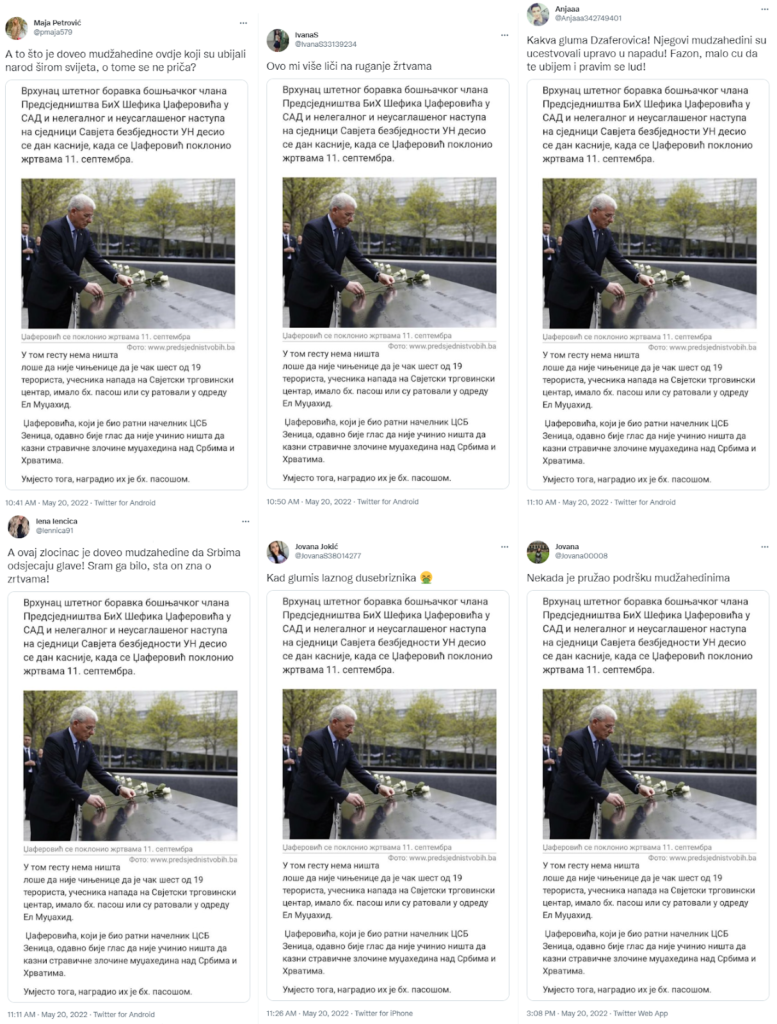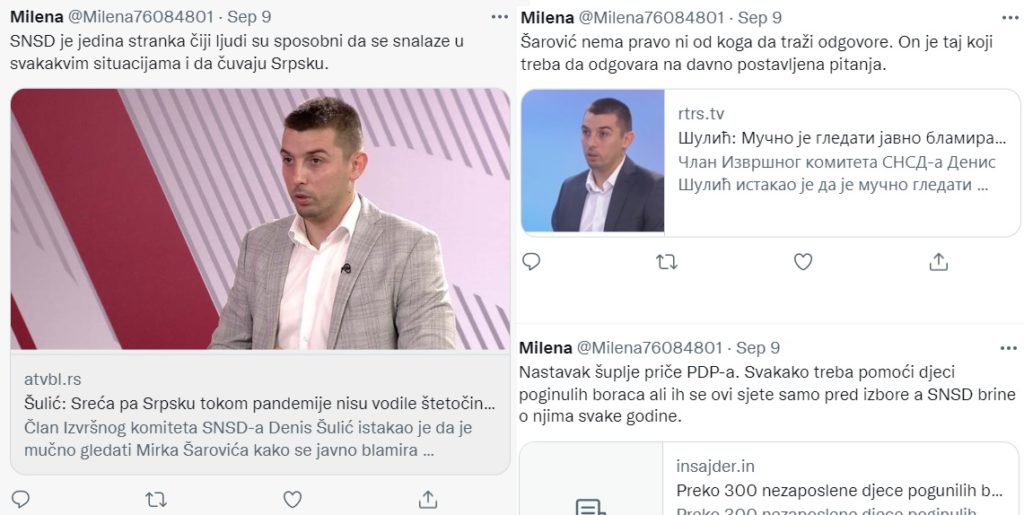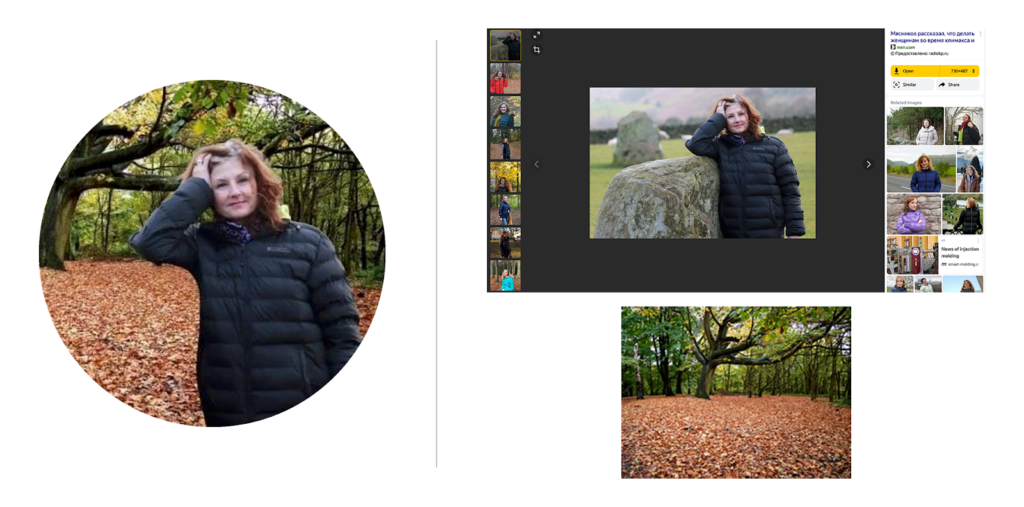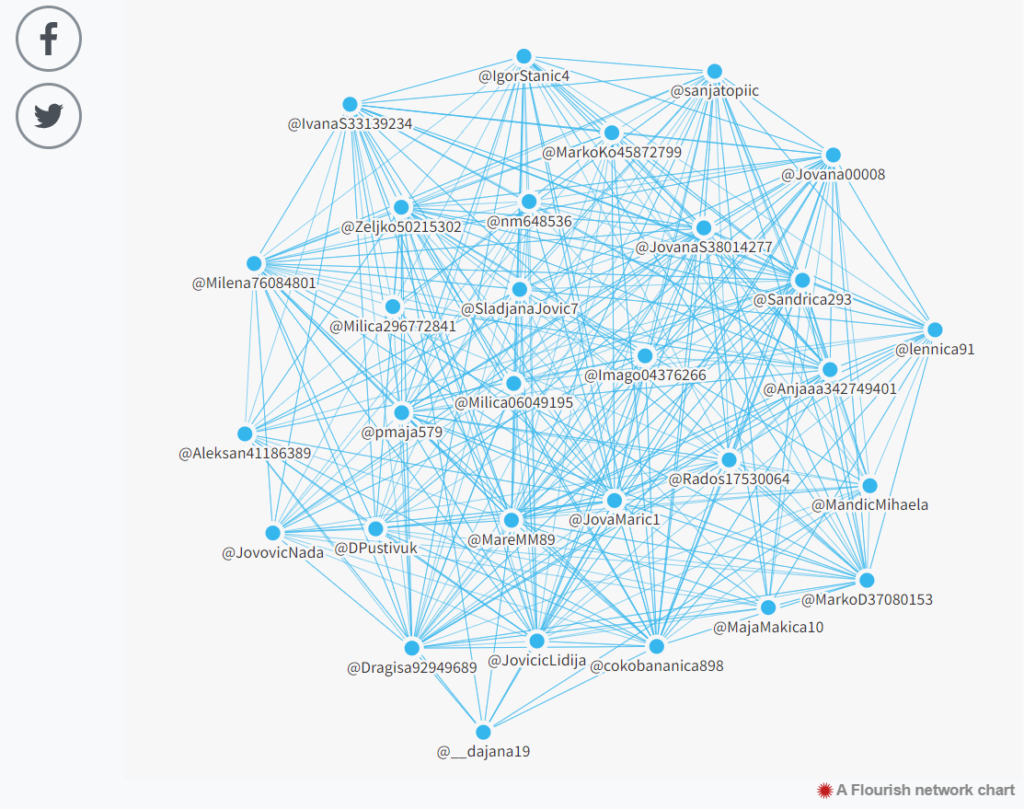Original article (in Bosnian) was published on 14/09/2022
Twitter accounts of questionable authenticity and unified “behavior”, interconnected and active in supporting SNSD and its representatives, most likely represent a network of party “bots”.
Social networks have become one of the most important spaces for political promotion. The public often speculates that they represent a kind of workplace for party “bots” – people who write posts and comment in support of political parties for a specific fee or as part of party engagement.
“Bot”, shortened from “robot”, is a name that, in the context of social networks, refers to automated accounts that are not run by real people and whose activities on the networks appear authentic. In our region, since examples of real automated accounts are rare or still poorly recognized, this term is used to describe accounts run by real people who promote certain (usually political) subjects through the so-called coordinated inauthentic behavior. The activity of “bots” of the Serbian Progressive Party, for example, is a frequent topic of investigative and other media in Serbia (1, 2, 3, 4). Thus, such practices are widespread in the region, and their existence and work are recognized as possible influences on public opinion.
According to Snopes, coordinated inauthentic behavior “is a phrase popularized and defined by Facebook as the use of multiple social media accounts or pages that hide the real identities of the people running the accounts to mislead and/or influence others for political or financial purposes”. Social networks, such as Facebook and Twitter, have taken certain steps towards reducing the existence of such networks of accounts since coordinated inauthentic behavior is an increasingly present phenomenon.
In February of 2021, Milorad Dodik announced that the Union of Independent Social Democrats (SNSD) would pay more attention to social networks in the coming period:
“We will hire an expert agency that will be guided by the issues of designing our relations with social networks. I think that in a few months we will be the most important factor on that front”, said Dodik at the time.
Dodik did not specify how this “plan” should be implemented or how his party would become “the most important factor” on social networks. However, a few months later, user accounts dedicated entirely to promoting SNSD began to appear on Twitter and Facebook, whose activities resemble the actions of automated accounts, so-called bots.
SNSD “network” on Twitter
There are at least 30 accounts on Twitter that are followed by almost 6,700 people on this social network and which, with very rare exceptions, only publish content related to SNSD. There is almost no activity on these accounts that is unrelated to SNSD and/or criticism of political opponents of this party. Most often, they share media articles that speak positively about SNSD and/or negatively about other parties and their members. Occasionally, the same posts appear on these profiles at the same time, with very similar, almost identical comments that follow the “party line” and political views. Such an example can be found in the picture below, where a screenshot of the same article published on RTRS the previous evening appeared on several such accounts in a short time.

The main activity of this “network” is sharing, that is, retweeting posts promoting SNSD policy, Milorad Dodik, Zeljka Cvijanovic and other party figures, and criticizing opposition parties and politicians, with special emphasis on Drasko Stanivukovic. Sharing Twitter posts from the official accounts of SNSD and the leader of this party or other users, which deal with topics important to SNSD, is frequent content. Retweets and links on these accounts are usually just shared without accompanying text or with short monotonous comments praising SNSD and criticizing, and often insulting, opposition parties or other persons and institutions towards which this party has a negative attitude. No authentic comments that deviate from this pattern cannot be found on these accounts, nor do they engage in interactions such as commenting or discussions on other people’s posts.

In addition to sharing the same or very similar content uniformly, these accounts have very similar names, that is, a Twitter handle that usually consists of a personal name and a series of numbers – for instance, @JovanaS38014277, @IvanaS33139234, @MarkoD37080153, @Milena76084801, @Aleksan41186389 etc. Archived links of these accounts, where you can see their entire activity until 8/9/2022, are available here.
Some of the profile pictures of these accounts appear inauthentic, showing people whose faces are not visible or not featuring people at all. Using four of the most trusted image search tools (Google Images, TinEye, Microsoft Bing, and Yandex), we searched the profile pictures used for these accounts and got results for only four pictures, which we determined did not depict the person whose profile they were on.
One of the photos shows the influencer Zana Jurisic. The second was taken from an advertisement for hair extensions, the third from an Instagram account under the name pikolaaaaa, which is no longer available, but the image can still be found in articles on certain web portals. For one of the profile pictures, we found that it represents a combination of two different pictures (1, 2), none of which shows the person whose name is on the Twitter account.


Twitter accounts from this network were created from March to October 2021.
The largest number of these accounts, 12 of them, were created in May 2021. Therefore, these accounts appeared after Milorad Dodik announced in February of the same year that SNSD would become the “most important factor” on social networks in the coming months. SNSD did not respond to our inquiry about whether and in what way this announcement was implemented.
The vast majority of these accounts are still active, and four stopped publishing content at the end of January 2022 (1, 2, 3, 4).
How are these accounts related?
Most of these accounts follow each other on Twitter, forming an intertwined network dedicated to promoting one party. These accounts, however, also follow other accounts on this social network. Twitter users often “follow back” accounts of people they don’t know, which is a possible explanation for the fact that more than 6,500 people follow this network of highly inauthentic Twitter accounts. Considering the number of accounts and existing followers, their activity on Twitter can reach a large number of users and thus carry out party promotion in the pre-election period.
After we determined that most of the listed accounts that operate the same way on this network follow each other, we entered the information about which account follows which profiles into the Flourish tool. So we created the illustration below showing these accounts’ tracking grid.

On Twitter, there is a kind of network of accounts on which unreserved support is given to the Alliance of Independent Social Democrats. It is not possible to conclude whether these accounts are run by people who share such posts out of their own convictions or individuals who do it for a specific benefit through several different, often fake, accounts.
Raskrinkavanje wrote about the activities of party “bots” earlier from the point of view of their activities in the comments section on the web portal Klix. At that time, more than 250 user profiles were identified who, during the 2018 election campaign, provided unreserved support to SDA, SBB and SDP political parties in the comments on this web portal.
Although the mentioned Twitter accounts are public, they made it impossible to receive messages. Therefore, we could not contact them before this analysis’s publication. SNSD did not respond to our inquiry about the existence of accounts on social networks through which apparently “organic” promotion of the party is carried out in the pre-election period.
We also searched other social networks for accounts with the same names and the same images. We found six accounts on Facebook (1, 2, 3, 4, 5, 6) with the same names, pictures and the same support for SNSD as is present in their Twitter versions. However, in addition to them, many accounts on Facebook function according to a similar principle as those on Twitter, which we will write about in another analysis dedicated to SNSD’s party “bots”.



